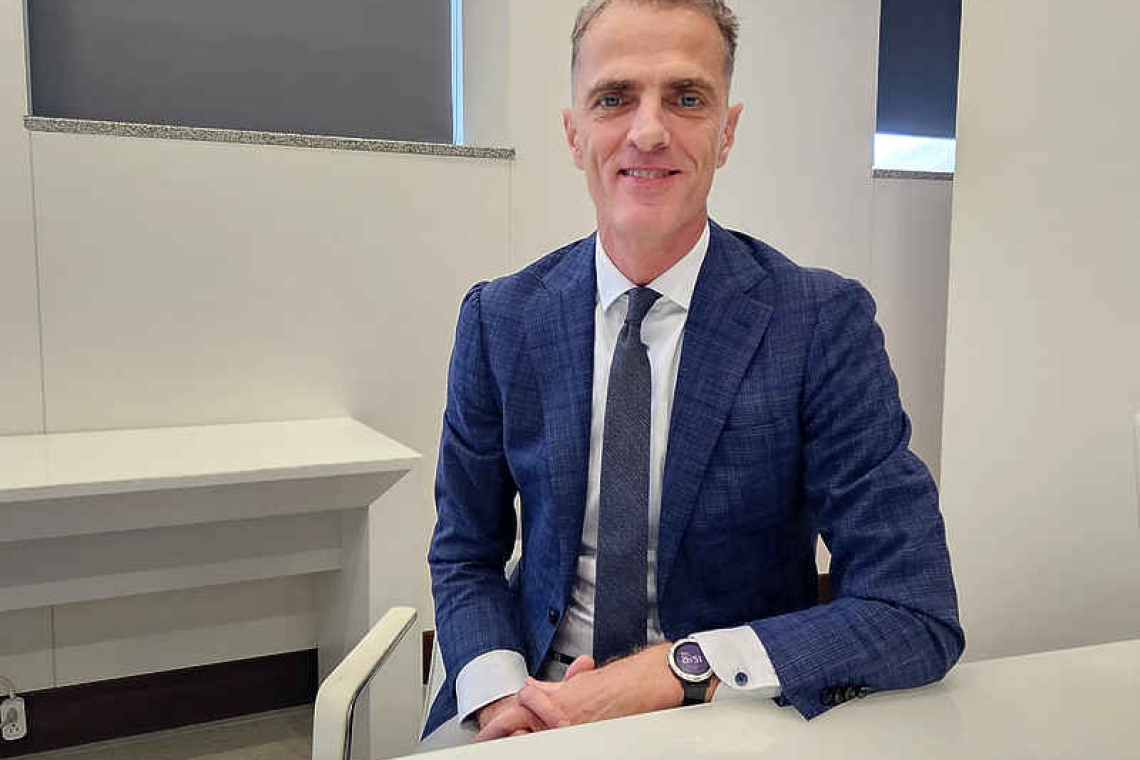CBCS President Richard Doornbosch.
PHILIPSBURG--The clock cannot be turned back on the introduction of the new Caribbean guilder Cg. currency (International Organization for Standardization (ISO) currency code XCG) for the monetary union of St. Maarten and Curaçao. Production of the new currency, which will be introduced on March 31, 2025, has started, says Central Bank of Curaçao and St. Maarten (CBCS) President Richard Doornbosch.
The CBCS head provided the information during an interview with “The Daily Herald” at the CBCS St. Maarten office in Philipsburg. He was asked whether the introduction can be stopped given the negative reaction by those who don’t see the need for the introduction of a new currency at this stage.
Crane Currency, Royal Canadian Mint is producing and supplying the new currency, the production of which is being funded by CBCS to the tune of NAf. 15 million. CBCS had entered into a partnership with Crane Currency and the Royal Canadian Mint, to (respectively) produce and supply the banknotes and coins for new currency.
Doornbosch told this newspaper that the existing guilder currency needed to be updated given the outdated security features, which makes it easier for falsification, and noted that the Central Bank has a responsibility to ensure a safe and secure payment system.
“The [Netherlands Antillean guilder – Ed.] bank note is broken and there is still falsification going on in St. Maarten. It is not up to date any more so basically, we are running out of the notes and the coins because they… go to the shredder if they are not of sufficient quality any more,” he explained.
He made clear that the CBCS executes the decisions of the governments of Curaçao and St. Maarten and alluded to the 13 years it took to execute the law to keep the guilder and decide not to dollarise.
“Can we still return? The reality is … we ordered the notes. They are being fabricated and they are, let’s say, on the boat to Curaçao and St. Maarten and so there is no way to turn back that train. The money is spent,” he said.
The door is, however, not closed to dollarisation. “The money is spent, but obviously you can still take a decision [on dollarisation]. The government didn’t take the decision that they don’t want to dollarise; they just say that we need some other bank notes and coins in the meantime and we cannot wait for this discussion to solve, because in the end, if you want to dollarise, you need to have a decent discussion on how: if you don’t have a Central Bank how then you will do integrity supervision of your banking system? How will you do prudential supervision of your insurance companies? How will you make sure that the circulation of money is being handled? You need to come to alternative arrangements and that takes time because it takes legislation; you need to come to an agreement between all parties and you need to make arrangements with the Curaçao government as well.”
The International Monetary Fund (IMF) had advised that at least three to four years would be needed for a decent preparation to potentially dollarise.
“You can always revisit this issue and we couldn’t wait for that, because then we would basically not be fulfilling our obligation to ensure a safe and secure payment system. That is our responsibility ... Fortunately the governments gave their blessing so that you [can] at least continue providing this more secure banknote.”
He added: “We cannot turn back the clock. So, this is going to happen. We also informed the international organisations that the ISO [currency] code is going to change … The payment system is something that is interconnected internationally, because you also want to pay your foreign suppliers etc. So, they have a new ISO code now in their system for next year. This is not going to change and it’s up to governments to decide what, in the future, will be the appropriate monetary exchange rate regime, he noted.







